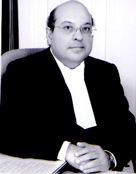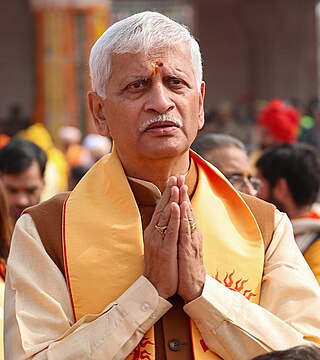Related Research Articles

The Supreme Court of India is the supreme judicial authority and the highest court of the Republic of India. It is the final court of appeal for all civil and criminal cases in India. It also has the power of judicial review. The Supreme Court, which consists of the Chief Justice of India and a maximum of fellow 33 judges, has extensive powers in the form of original, appellate and advisory jurisdictions.

The High Court of Bombay is the high court of the states of Maharashtra and Goa in India, and the union territory of Dadra and Nagar Haveli and Daman and Diu. It is seated primarily at Mumbai, and is one of the oldest high courts in India. The High Court has circuit benches at Nagpur and Aurangabad in Maharashtra and Porvorim,

The Chief Justice of India (CJI) (ISO: Bhārat kē Mukhya Nyāyādhīśa) is the highest-ranking officer of the Indian judiciary and the chief judge of the Supreme Court of India. The Constitution of India grants power to the President of India to appoint, as recommended by the outgoing chief justice in consultation with other judges as envisaged in Article 124 (2) of the Constitution, the next chief justice, who will serve until they reach the age of 65 or are removed by the constitutional process of impeachment.
Section 377 is a British colonial penal code that criminalized all sexual acts "against the order of nature". The law was used to prosecute people engaging in oral and anal sex along with homosexual activity. As per a Supreme Court Judgement since 2018, the Indian Penal Code Section 377 is used to convict non-consensual sexual activities among homosexuals with a minimum of ten years’ imprisonment extended to life imprisonment. It has been used to criminalize third gender people, such as the apwint in Myanmar. In 2018, then British Prime Minister Theresa May acknowledged how the legacies of such British colonial anti-sodomy laws continue to persist today in the form of discrimination, violence, and even death.

Yeshwant Vishnu Chandrachud was an Indian jurist who served as the 16th Chief Justice of India, serving from 22 February 1978 until 11 July 1985. Born in Pune in the Bombay Presidency, he was first appointed a Justice of the Supreme Court of India on 28 August 1972 and is the longest-serving Chief Justice in India's history at 7 years and 4 months. His nickname was Iron Hands after his well-regarded unwillingness to let anything slip past him.

Dhananjaya Yeshwant Chandrachud is an Indian jurist, who is the 50th and current chief justice of India serving since November 2022. He was appointed a judge of the Supreme Court of India in May 2016. He has also previously served as the chief justice of the Allahabad High Court from 2013 to 2016 and as a judge of the Bombay High Court from 2000 to 2013. He is ex-officio Patron-in-Chief of the National Legal Services Authority.
In India, a binding decision of the Supreme Court/High Court can be reviewed in review petition. The parties aggrieved on any order of the Supreme Court on any apparent error can file a review petition. Taking into consideration the principle of stare decisis, courts generally do not unsettle a decision, without a strong case. This provision regarding review is an exception to the legal principle of stare decisis.

Rohinton Fali Nariman is a former judge of the Supreme Court of India. Before being elevated as a judge, he practised as a senior counsel at the Supreme Court. He was appointed the Solicitor General of India on 23 July 2011. He also served as a member of the Bar Council of India. He was designated as a Senior Counsel by Chief Justice Manepalli Narayana Rao Venkatachaliah in 1993 at the early age of 37.

Jagdish Singh Khehar is a former senior advocate and a former judge, who served as the 44th Chief Justice of India in 2017. Khehar is the first chief justice from the Sikh community. He has been a judge in Supreme Court of India from 13 September 2011 to 27 August 2017 upon superannuation. He served for a brief period but gave many landmark judgements such as the Triple Talaq and the Right to Privacy verdict. He was succeeded by Justice Dipak Misra.

Ranjan Gogoi is an Indian former advocate and judge who served as the 46th Chief Justice of India from 2018 to 2019, having previously served as a Judge of the Supreme Court of India from 2012 to 2018. He is currently a Member of the Rajya Sabha, having been nominated by President Ram Nath Kovind on 16 March 2020. Gogoi served as a judge in the Gauhati High Court from 2001 to 2010, and then was transferred as a judge to the Punjab and Haryana High Court from 2010 to 2011 where he later was the Chief Justice from 2011 to 2012. He is also a member of the Committee on External Affairs in the Rajya Sabha.

Dipak Misra is an Indian jurist who served as the 45th Chief Justice of India from 28 August 2017 till 2 October 2018. He is also former Chief Justice of the Patna High Court and Delhi High Court. He is the nephew of Justice Ranganath Misra, who was the 21st Chief Justice from 1990 to 1991.

Nuthalapati Venkata Ramana is a former Indian judge and journalist who served as the 48th Chief Justice of India.

Uday Umesh Lalit is an Indian lawyer and former Supreme Court Judge, who served as the 49th Chief Justice of India. Previously, he has served as a judge of Supreme Court of India. Prior to his elevation as a judge, he practised as a senior counsel at the Supreme Court. Justice Lalit is one of the eleven senior counsels who have been directly elevated to the Supreme Court. He is currently ‘Distinguished Visiting Professor’ at Ashank Desai Centre for Policy Studies, Indian Institute of Technology, Bombay and Distinguished Visiting Professor at West Bengal National University of Juridical Sciences.

Justice K.S. Puttaswamy (Retd.) &Anr. vs. Union of India &Ors. (2017), also known as the Right to Privacy verdict, is a landmark decision of the Supreme Court of India, which holds that the right to privacy is protected as a fundamental right under Articles 14, 19 and 21 of the Constitution of India. The original petitioner Justice K.S. Puttaswamy was former judge of the Karnataka High Court
Brijgopal Harkishan Loya was an Indian judge who served in a special court which deals with matters relating to the Central Bureau of Investigation (CBI). He was presiding over the Sohrabuddin Sheikh case, and died on 1 December 2014 in Nagpur. A bench of the Supreme Court of India, headed by the Chief Justice of India Dipak Misra, on April 19, 2018, dismissed the public interest petition (PIL), and stated the death to be natural and such petitions to be an attack on the Judiciary.
Vijaya Kamlesh Tahilramani is a former Indian judge and prosecutor, who last served as the chief justice of the Madras High Court. Previously, as a judge of the Bombay High Court, she notably upheld the conviction of several persons for the rape of a pregnant Muslim woman during the 2002 Gujarat riots, chastising investigative authorities for their inaction in the matter, and also refused parole for those convicted in the 1993 Bombay bombings. She retired in 2019, after refusing to accept a controversial transfer from the Madras High Court to the Meghalaya High Court.

Navtej Singh Johar &Ors. v. Union of India thr. Secretary Ministry of Law and Justice (2018) is a landmark decision of the Supreme Court of India that decriminalised all consensual sex among adults, including homosexual sex.
The Places of Worship Act, 1991 seeks to maintain and protect the religious character of places of worship in India. The full text of the code is available online through India Code: Digital Repository of Laws. It may be downloaded in the PDF format through the website of the Ministry of Home Affairs.

Ujjawal &Anr. versus State of Haryana&Ors.(2021), a case where Punjab and Haryana High Court, refused to provide police protection to a couple facing threat to their lives and personal liberty, citing potential disruption to "social fabric of the society."
References
- ↑ Manubarwala, Aditya (2023-05-29). "From Master of the Roster to Master of All Judges". The Hindu. ISSN 0971-751X. Archived from the original on 2024-08-19. Retrieved 2024-08-19.
- ↑ "Justice DY Chandrachud, Set to Become CJI in 2022, Finds Place in All Important Matters of SC". News18. 2019-11-10. Archived from the original on 2022-01-22. Retrieved 2024-08-19.
- ↑ "DMRC arbitration: The Court upheld principles of natural justice in the curative petition". Supreme Court Observer. Archived from the original on 2024-08-19. Retrieved 2024-08-19.